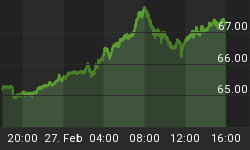Today's release of retail sales surprised the market. The Commerce Department released that retail sales grew only 0.3% in February, well below the 1% economists expected. Excluding auto sales, retail sales increased 0.2%. Let's not forget that January's sales increased 1.2%, which was must faster than anticipated. Since the Commerce Department's figures are month-over-month, the 0.3% increase might not be as weak as the market's reaction suggest. Sales data released by the top retailers in the nation lead to a completely different conclusion. I monitor the monthly sales of 26 of the larger retailers. This basket of retailers posted a whopping 10.9% increase in sales on a year-over-year basis. Just as amazing, these retailers posted an 11.9% sequential increase in sales.
| Feb-02 | 10.9% |
| Jan-02 | 5.2% |
| Dec-01 | 7.3% |
| Nov-01 | 7.9% |
| Oct-01 | 7.3% |
| Sep-01 | 6.3% |
| Aug-01 | 7.9% |
| Jul-01 | 8.5% |
| Jun-01 | 8.1% |
| May-01 | 6.6% |
| Apr-01 | 8.8% |
| Mar-01 | 8.6% |
| Feb-01 | 7.3% |
Admittedly, I'm not an economist and this sales data is not seasonally adjusted or put through any other massages. But this flies in the face of the retail data calculated by the Commerce Department as much as the National Association of Realtors' existing homes sales, up 16.2%, contradicted the Commerce Department's new home sales, down 14.8%.
I, like everyone else, have been waiting for the consumer to roll over. Maybe this is the first indication of that. But the question is not when Joe Sixpack is going to start acting responsible, retrench and quit spending more than his income. The American consumer has proven that he is financially irresponsible and will spend whatever amount is lent to him. So the real question is when will Household stop financing Joe Sixpack's purchases of a HDTV at Best Buy, and how long will Ditech keep refinancing inflated houses.
Mortgage rates are staring to tick up. Increasing rates will likely slowdown the refinancing turning a tailwind into a headwind for the economy. But consumers have been known to refinance at a higher rate just to have access to cash. This mentality has started confusing people on what is income. An article published yesterday by Bloomberg that discussed how the tax refunds are helping the economy included this line: "Moderate-income households have a larger proportion of their assets in homes, a source of income through mortgage refinancing." A source of INCOME? No wonder consumer credit has grown at such a rapid pace when filling out a pre-approved credit card form is viewed as getting a 10% raise.
Qwest provides one more example of how the current crop of corporate leaders are those that were the most aggressive. Christopher Byron penned a column this week that shed light on some of the "sources" of revenue growth. Qwest was able to "grow" its yellow pages business by "flashing" customers. The column recounts one manager's experience of billing an account for $275,000 for a $30,000 sale. The amount would later be reversed out, but done in the next quarter. Disgruntled employees are also indicating that a portion of Qwest's IRU deals were nonmonetary in nature. IRUs are indefeasible right of use agreements that would guarantee the customer a certain amount of bandwidth at a set price. The problem with the agreements is that companies would basically swap agreements for different areas. One would swap capacity Seattle to LA for New York to Boston. If the agreements were "nonmonetary" then revenue was booked without receiving any cash. Additionally it appears that the revenue was frontloaded, while the cost was capitalized. By capitalizing the cost, companies were able to defer the cost of the capacity they purchased. It does not take a rocket scientist, and unfortunately nor a Wall Street analyst, to figure out that this inflates earnings. Obviously, a very small number of corporations participated in fraud, but aggressive business practices are quite widespread. These aggressive practices are now reversing and will put additional pressure on earnings going forward.
Technology continues to bottom, and will likely to continue to bottom for the near future. This week Lucent and Nokia announced that revenue was getting harder to come by than previously anticipated. Nokia said while its handsets were on track, its infrastructure sales will be down 25% year-over-year. Just six-weeks ago Nokia thought sales would only be down 16%. Lucent's developments sound more dire for the telecom industry. Revenue will grow a "modest to 10%," even though growth of 10% to 15% was anticipated just three weeks ago. Profitability was pushed out to 2003, from 2002.
Investors have embraced the jump in DRAM prices and have bid up stocks. The Philadelphia Semiconductor Index is up over 11% this year. DRAM prices have risen over 80% this year, but it has come from PC makers increasing the amount of memory in each computer instead of selling more computers. Now, computer makers are indicating the rise is over as "memory-chip prices will face pressure in the second quarter as demand for computers slows due to seasonal factors," said Tim Li, CFO of Quanta computers, Taiwan's largest laptop computer maker.
Between Nokia, Lucent and the PC makers, there sure does not appear to be much confidence that the recovery in technology is underway. However, the consumer remains bulletproof. The dual economy that started early last year continues today. It all depends who is deemed credit worthy.















